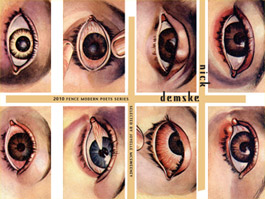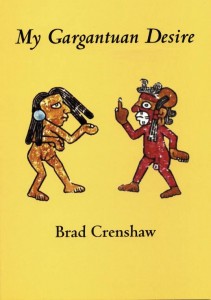Book Review
Editor’s note: This is a review of three books of poetry.

Nick Demske, by Nick Demske
(Fence, 2010)

By the Numbers, by James Richardson
(Copper Canyon, 2010)

My Gargantuan Desire, by Brad Crenshaw
(Greenhouse Review Press, 2010)
When Auden, almost a century ago, took up the then-fraught idea of “free” verse in an essay, he employed the metaphor of the lone poet on a desert island. The rare poets, he argued, would transform themselves into Robinson Crusoes, making their own productive habits and creating a new poetics. For most poets, however, he said, “the result is squalor.” That tempting challenge—to innovate and invent—has lured poets into experimental poetry, despite Auden’s prophecy. On this island of experiment, poets detonate conventional sonnet forms and reengineer them; they mingle comment and list with the traditional poetic line; and they, perhaps most dangerously, set up camp in the risky, ever-shifting border between poetry and prose.
In his self-titled debut, the 2010 Fence Books’ Modern Poets Series selection, Nick Demske enters the experimental realm through the sonnet, the most orthodox of forms. Though the poems throughout his book all feature fourteen lines, their meters, line endings, and rhymes (or lack thereof) rarely resemble anything Miltonic or Petrarchan.
Demske’s tone offers a precocious, effortless chat that aims primarily to startle: “How like you mine glamour shots? Loosely tied robe / Peaking leprose decreprose in patrol car strobe // Twilight (cuff me officer, make / Me make no sudden movements).” Frequently referring to himself in third person, tossing off impenetrable proper nouns (“Methylprednisolone is a glucocorticoid”) and switching pronouns of address like a corner shell game, Demske makes the orthodox reading of his sonnets impossible. He provides poetry for readers interested in language play, fresh shifts in register, and frequently delightful knots of language. Devotees of lucid, narrative metrical poetry will likely roil in frustration.
At his experimental best, Demske recalls New York School poet Ted Berrigan’s early work in sonnet reformation. Where Berrigan frequently employed the intimate form as a confessional container, however, Demske hesitates to show the reader the poet’s face or heart. When Demske does slow his Gatling gun slang, his sonnets approach the contours of emotion ingrained in the sonnet. In “Negro Spiritual,” his voice jabs at caustic truths more docile poets would avoid. He writes, “The only thing fair about God is his skin. / Sorry to rain on your million man march. / If you’re in my country, you ought speak the King / Of kings English. You ought lynch your collar starched.” No reader would mistake these poems for quiet reflection, but Demske’s most effective moments, like “Negro Spiritual,” sculpt his relentless buzz onto the sturdy frame of the sonnet. Puns, clichés, a surfeit of pop culture, references to vile sentiments all fill the passage of fourteen lines.
Whereas Demske tinkers with a concise form to contain excess, James Richardson, in his latest collection, 2011 Jackson Poetry Prize winner and National Book Award finalist By the Numbers, magnifies his laconic, aphoristic streak through a wide range of received forms beyond the sonnet. Simultaneously teasing the informed reader and inviting the curious, he warps a number of poems into shadowy pseudo-forms designed to emulate classical shapes.
A half dozen of the book’s lyrics fall between eighteen and twenty-one lines, recalling the villanelle. “Iron Age” restructures the form’s refrain, building thematic associations to consumerism where the two literal refrains should go. For example, in the first two locations where the second refrain would appear, he offers “He brought me, as was meet, utensils,” followed by “that he may forget what meat he feasts on,” five lines later. Careful readers can delight in the subtle manipulations of form, while the casual ones can simply savor the gastronomic references. “Bit Parts” turns the pantoum cockeyed, warping its recursive borrowing of previous lines into revised self-identifications: “In that monster epic of the checkout girl / I’m the guy setting groceries on the belt.” Soon after, the speaker says, “And in the film of the autumnal Liebestod / I’m the guy sliding her the desperate ticket.” Without these atomized pseudo-forms, Richardson’s contemplations of aging and disintegration would slip into pure pathos.
Richardson alters the everyday world in his inherited form mutations and free verse efforts alike. In “Metallurgy for Dummies,” each disassociated object smudges together, masking the poem’s concerns with waning senses:
Faint tinnitus
Where is it?
Air silver with a trillion
Wireless calls,
Stop-quick stop-quick
Of sweep hands
Crickets and downed lines
Their sing of tension
That out-of-earshot
Too-bright CD sun
The heads of presidents
Sleet sleet in your jacket
Here, this imposing pile of things—jackets, downed lines, digitally swamped air—funnels back to the opening line’s “tinnitus.” Tinnitus itself, the genetic predisposition for ringing in one’s ears that grows more dramatic with age, forms a hinge whose meaning we see only after absorbing the sprawling list of sensory-overloading objects. Richardson induces meaning backward across the couplets. Like all experimental poetry, Richardson insists that the reader work at least as hard as the poet.
Richardson’s aphoristic impulses (he’s published two books composed exclusively of aphorisms) take full flight in the book’s final section. Titled “Vectors 3.0: Even More Aphorisms and Ten-Second Essays,” this section provides a list of aphorisms as single-line stanzas: “60. Build bottom up, clean top down. // 61. Precision strike. We’re only killing that one guy. And actually / only his worst thought. And there, just a little to the left of the / middle, only the very worst part of that.” Richardson’s ceaseless experimentations in both received forms and in the poetic line itself imbue By the Numbers with a youthful zeal that buoys the poet’s mid-career meditations. The abundance of droll, subversive experiments in Richardson’s 111 pages may occasionally frustrate, however, camouflaging a voice that engages with communal themes of aging and erasure.
In contrast, Brad Crenshaw’s My Gargantuan Desire, like Demske’s work, deploys a single experimental motif across an entire volume. Crenshaw, a trained and practicing neuropsychologist, writes taut, candid, prose poems—the neither-fish-nor-foul form that delights and confounds critics—supplying both a refuge for readers who admire so-called flash fiction and a counterintuitive text for poetry audiences.
Crenshaw’s subjects inhabit the traditional, dominant poetic themes of family, work, religion, and death. He evokes his own career as a scientist and academic in various poems. In “Out of Mind,” his own fury at the American medical system finds voice in hyperbole: “The wealth of illness is, you know rich. Watch it jerk around the burghers and petty idiots of managed care who fail to see the terrorist depression hit, who missed the crazy fit my patient threw about his meds…” The poem’s turbulent tone unfolds across the delineation, not just juxtaposing the speaker’s rage with the image of the disturbed patient, but making the frustration literally inseparable from the madness.
Taking a more readily familiar voice than either Demske or Richardson, Crenshaw’s work reminds readers of objectivist Lorine Niedecker’s “note pad” poems, daily reflections and distilled parables of her own life composed on small, daily calendar sheets. Though Crenshaw’s poems unfold more expansively, they retain that profound sense of daily intimacy. He describes, in “100 Conz,” his wife’s temporary retreat from academia:
Reminding me of money, Deborah quit the adjunct life of scholars, and worked that summer putting wolves back in the mountain. It was for a modern cause. I played dumb while she was fitting in among the radicals and campy literati. Blue woman she was called, and as the publicist, the bull she wrote came like second nature.
If he casually lineated these lines, their plain confessional and demotic tone would appear sloppy, easy. In the prose poem form, however, Crenshaw lets all his observations, comments, and images run together like linked synapses. One observation fires into the next.
Furthermore, in a small essay included at the book’s end, Crenshaw stresses the aural nature of his compositions, reminding the reader that poetry existed long before writing. Eschewing inherited critical terms, Crenshaw claims that his work exists in an “invisible format” that recalls poetry’s oral genesis. He conceives of the poems “as spoken aloud to someone dear to me.” In that flag-planting move, Crenshaw lives up to Auden’s lofty proposition: he has built his own world. His tidy method of delineation conjoins the quotidian and the irreverent (“I’ve never seen a Mass, or been a friend of dwarves and monks before I failed at tenure…”) within the same fourteen- or fifteen-line prose paragraph.
Where Demske falls into the pitfall of hijinks, and Richardson’s weaker experiments obfuscate his earnest concerns about aging, Crenshaw finds resonant, enduring sentiments in his “invisible format.” In the least “poetic” form of all, Crenshaw reaches the deepest into the true reservoir of poetry, a solitary voice rendering the world into artifacts of memory and emotion.
For these three poets, the goal of experimentation remains the same as when Auden first hinted at it: setting off on an untested poetic path assumes profound risk. For the intrepid poet willing to police his own lines, clean his own house, and check his own impulses, a singular habitat of his own lies within scope.
About the Reviewer
Evan McGarvey is an MFA candidate in poetry and a Milton B. Dolinger fellow in writing at Pennsylvania State University. His poems have appeared in The Michigan Quarterly Review, and his prose has appeared in The Village Voice, Pitchfork.com, and VIBE. As an undergraduate at the University of Michigan, he won an Underclassmen Hopwood Award and an Academy of American Poets' Prize.